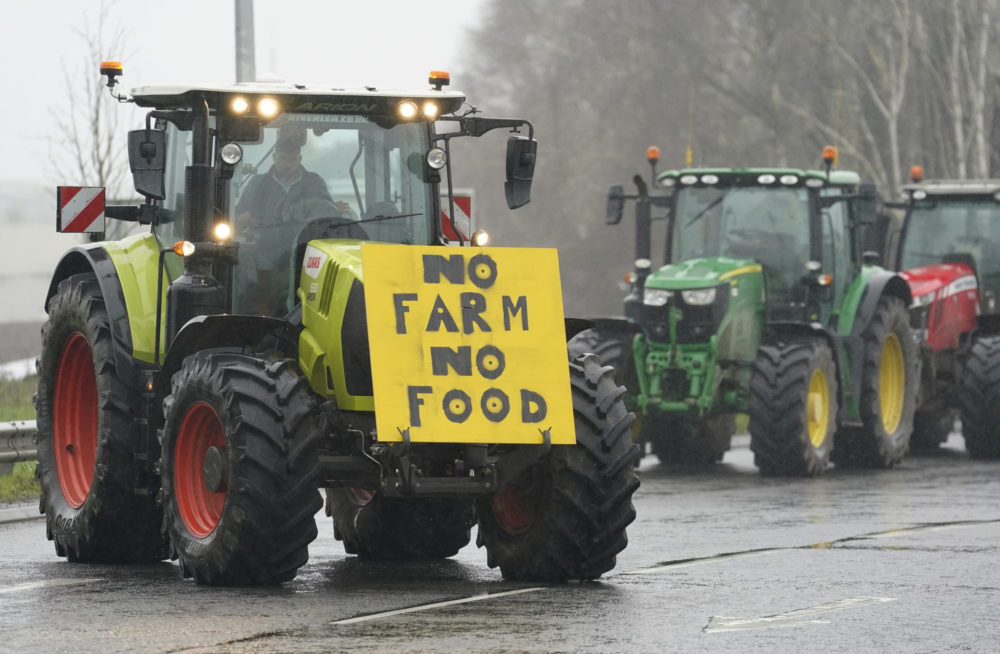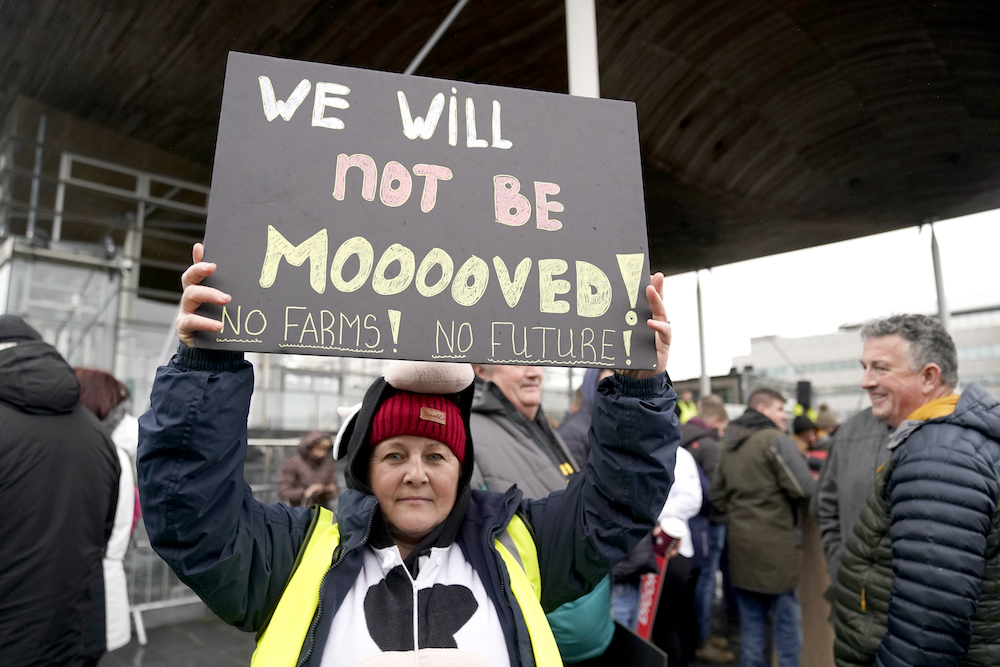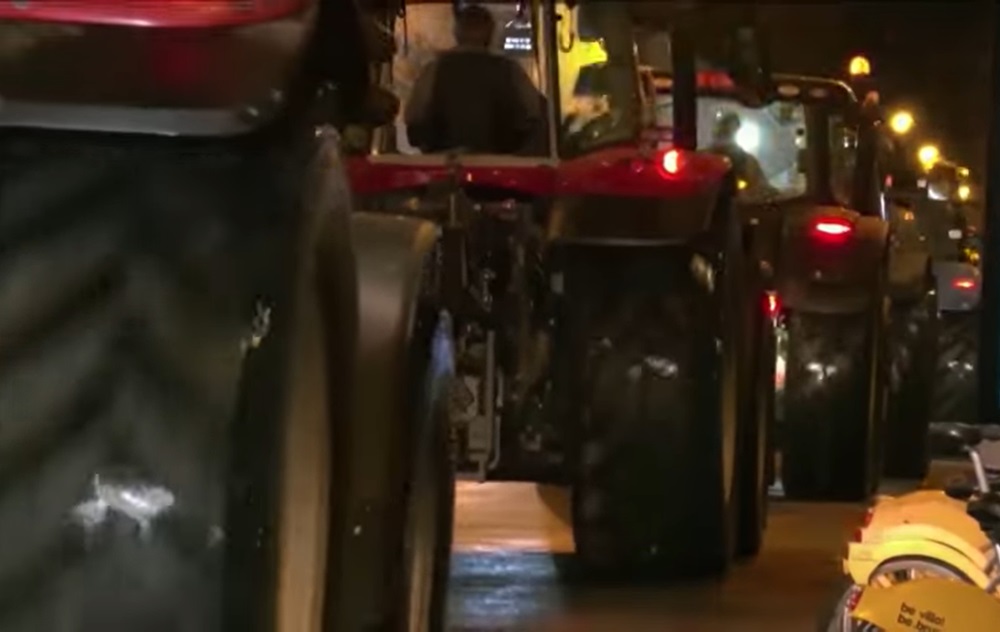Why farmers in Wales are up in arms

Alex Heffron, PhD Candidate in Geography, Lancaster University
Across Europe, farmers are protesting against changes to regulations and subsidy schemes. Smaller protests have spread through the UK – particularly in Wales, where thousands have turned out to air their grievances with the recent update to the Sustainable Farming Scheme (SFS).
This is the Welsh government’s proposed scheme to replace the EU’s common agricultural policy (CAP), which dedicated the majority of its budget to payments for every hectare of land managed.
The new scheme aims to give farmers public money for public goods – in other words, pay farmers from the public purse for the ecosystem services they provide that aren’t remunerated through the sale of produce. These include carbon sequestration, the maintenance of habitats, and the preservation of cultural landmarks.
To receive payments from the new voluntary scheme, farmers must comply with 17 actions that are aimed at improving biodiversity and general farm management.
Tree cover
Farmers have taken particular exception to the requirement to have 10% of their land under tree cover. Typically, this will not include hedgerows, as the aim is to increase the size and number of woodlands on farms. On top of this, farmers will be required to manage 10% of their land for semi-natural habitat, such as species-rich grasslands. Organisations such as Coed Cadw (Woodland Trust Cymru) stress that tree cover on the average Welsh farm is already around 6-7%.
The tree planting requirement, however, may be difficult for tenant farmers, who will need permission from landowners, while those with mortgages might be refused by banks as tree planting could reduce land values.
At a recent event I attended in Narberth in South Wales, the president of the National Farmers’ Union Cymru, Aled Jones, said the 10% requirements are too much and would hit food production (the UK already imports around 46% of its food) and the rural economy. There is also the continuation of the Welsh language to consider: 43% of agricultural workers speak Welsh, the highest of any industry by far.
Economic crisis is brewing
Governments are obliged to meet net zero targets while farmers are clinging to their livelihoods in a difficult economic climate. Farmers receive very little of the retail value of their produce. Dairy farmers in the UK typically receive less than 1p of the retail value of a 480g block of cheese.
Production costs are rising globally. Prices of feed, fuel and fertiliser have soared along with interest rates and energy costs, making it harder than ever to turn a profit. Many farmers could go out of business if their subsidy income falls, particularly on smaller farms.

Research commissioned by the Welsh government suggests the new scheme will shrink farm incomes and cause an overall annual hit of £199 million (US$250 million) to the Welsh farming economy. It predicts that livestock numbers will decrease, with an associated loss of farm jobs.
And this figure doesn’t include the indirect impact on rural economies, which are often highly dependent on farming. It comes after years of UK farmers being told they’ll be financially supported to make a green transition. Many feel a sense of betrayal. The exact payment details for SFS won’t be announced until later in 2024, and this uncertainty is making many anxious.
With declining subsidy levels, some UK farmers will be forced to sell up. Some farms are already being bought by large investment funds for timber production and the sale of carbon credits to companies looking to “offset” their emissions, a practice that has been criticised as greenwashing. One investment firm has already purchased several Welsh farms with the stated aim of buying as much as 166,000 hectares in Wales, which would make it one of the country’s largest landowners.
A new form of politics
We are witnessing the limits of a green transition constrained by austerity, which in this case forces the onus of decarbonisation onto individual farm businesses. This is instead of tackling the systemic challenges.
Government investment in Welsh agriculture has declined in real terms over the last decade. Farmers are concerned that funding for the new scheme will not continue far enough into the future to make it worthwhile planting trees and creating habitats. A low uptake, with many farms instead being sold, may not be a bad thing for the Welsh government if it only seeks to reduce public spending and emissions from agriculture. This would also make more land available for forestry, which will help Wales reach its tree-planting targets.
However, if food production declines, more food will be imported, which merely displaces the environmental consequences of food production to other parts of the world. Alternatives such as agroforestry could bridge the gap between these competing demands, with trees aiding, not hindering, food production. One example, called silvopasture, involves planting rows of trees in fields at regular intervals, allowing animals to graze or crops to be cultivated either side.
A farming system transition will take time, requiring wider reforms and greater economic security for farmers. Given that the UK is the world’s third-largest importer of timber products, and only 15% of Wales is forested compared with 39% of total EU land, more trees are needed. But it is counterproductive for the Welsh government to alienate farmers – the scheme needs to take into account of the constraints being placed on them.

European farmers’ protests have already led to governments relinquishing some of the proposed changes, such as scrapping plans to halve pesticide use. But while frustration is justifiable among farmers, the urgent need to tackle climate and ecological breakdown remains.
The scale of this challenge demands a new form of politics, rooted not in austerity but renewed public spending on food and farming systems, combined with prompt action against the parts of the supply chain that are hoarding all the profits.
Supermarkets continue to post eye-watering profits, while farmers endure low prices and consumers face high prices from profiteering.
The answer isn’t to renounce decarbonisation or environmental regulations. The answer is to fight for a just green transition, where farmers are better supported to make the necessary changes towards a more socially and ecologically just food system.
This article was first published on The Conversation
![]()
Support our Nation today
For the price of a cup of coffee a month you can help us create an independent, not-for-profit, national news service for the people of Wales, by the people of Wales.








The tories of the uk government have caused more harm to farmers; making trade deals with Australia and New Zealand that disadvantage the uk, failing to keep their promise of post-brexit subsidies at the the same level as EU subsidies (with consequential affect on Llywodraeth Cymru funding available)! The tories are hijacking the farmers protesting here in Cymru as a way to try to make political advantage because with the tories you aren’t allowed to protest against their policies, only when they can appear to be on the same side as the protestors (which is purely to try to hang… Read more »
If farmers are to be helped with meeting new a new green agenda they need to be made more profitable and that means earning more. At the moment it seems supermarkets are dictating and taking too much, their profits are skyrocketing at the expense of the farmers. If the Welsh government wants it’s policy to succeed, it should start to tackle these supermarkets and also food manufacturers, who not only have been ripping off farmers but the general public too, increasing profits in areas like shrinkflation and skimpflation.